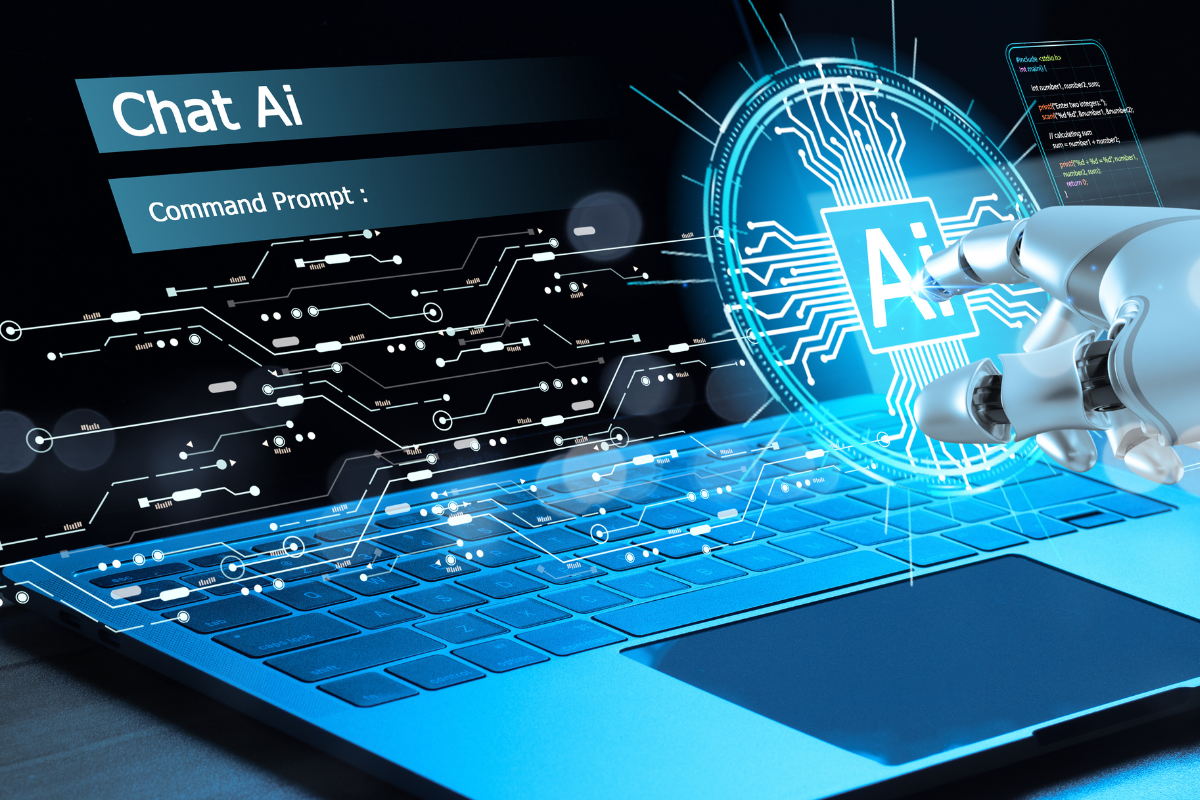Introduction to AI-Generated Content
The advent of artificial intelligence (AI) has heralded a significant transformation in various domains, including content creation. AI-generated content refers to text, images, or other media produced by artificial intelligence technologies. Leveraging advancements in machine learning and natural language processing, AI systems can now compose coherent and contextually relevant material, mimicking human-generated outputs. This technology not only automates the creation of written content but also ensures it aligns with the desired tone, style, and subject matter.
The process of generating AI content involves training algorithms on vast datasets, enabling the systems to understand linguistic patterns and contextual nuances. Natural language processing (NLP), a critical subset of AI, plays a pivotal role in interpreting, generating, and refining text. When tasked with content creation, these AI models analyze the input, draw on their learned data, and produce outputs that adhere to the specified parameters.
The concept of AI in content creation is not new; its roots can be traced back to early computer programs designed to simulate human-like text generation. However, significant milestones in machine learning, particularly the development of deep learning models, have exponentially accelerated the capabilities of AI systems. Technologies such as GPT-3 (Generative Pre-trained Transformer 3) exemplify the cutting edge of this evolution, showcasing remarkable proficiency in generating diverse and sophisticated content.
AI-generated content is increasingly prevalent across various sectors. In journalism, for instance, AI tools are employed for drafting news articles and summarizing reports. Marketing professionals leverage AI to craft personalized advertisements and social media posts. In the entertainment industry, AI assists in scripting screenplays and generating music. The rise of AI-generated content represents not just a technological breakthrough but a paradigm shift in how content is conceived and disseminated.
Advantages of AI Content Creation
The integration of Artificial Intelligence (AI) into content creation has brought about numerous advantages, fundamentally changing the way digital content is produced and managed. One of the most significant benefits is increased efficiency. AI algorithms can generate high-quality content rapidly, outperforming human writers in speed and output volume. This efficiency allows businesses to respond swiftly to market demands and trends, enabling a more dynamic content strategy.
Cost savings represent another substantial benefit of AI content creation. Automating content production reduces the dependency on large teams of writers and editors, thereby cutting operational expenses. Businesses can allocate resources more effectively, investing in other critical areas such as marketing and product development.
Consistent quality is a hallmark of AI-driven content. While human creativity is often subject to fluctuations, AI maintains a stable standard of output. This consistency ensures that brands can sustain a uniform voice and style across all their content, enhancing brand identity and reliability in the eyes of the audience.
Scalability is yet another compelling advantage. AI can handle vast amounts of content effortlessly, making it ideal for businesses looking to scale their operations. Whether it’s producing numerous articles, social media posts, or personalized messages, AI can manage the workload without compromising quality or accuracy.
Moreover, the ability to personalize content for different audiences sets AI apart. Using data analytics, AI can create targeted content that resonates with specific demographics or user groups. This personalization enhances user engagement and satisfaction, translating into higher conversion rates and customer loyalty.
Several businesses have successfully harnessed AI for content creation. For example, The Associated Press uses AI to generate earnings reports, freeing up journalists to focus on more in-depth stories. Similarly, online fashion retailer Stitch Fix employs AI to craft personalized styling suggestions, thereby enhancing the customer experience.
The advantages of AI in content creation are clear and multifaceted. Increased efficiency, cost savings, consistent quality, scalability, and personalization capabilities make AI an invaluable tool in modern digital landscapes. As more businesses explore and adopt these technologies, the transformative impact of AI on content creation will undoubtedly continue to grow.
Challenges and Limitations of AI Content
The proliferation of AI-generated content offers numerous benefits; however, it is also accompanied by substantial challenges and limitations. One significant issue is the matter of creativity and originality. While AI systems excel at processing and generating text based on existing patterns, they often fall short in producing truly unique and inventive content. These systems tend to rely heavily on pre-existing data sets, leading to content that may appear formulaic and repetitive over time.
Another critical limitation is the potential for biases in AI algorithms. Since AI models are trained on human-created data, inadvertent biases present within these datasets can get embedded into the AI’s outputs. This can result in the perpetuation of stereotypes or the unfair representation of certain groups. Addressing these biases requires comprehensive checks and data auditing to ensure a balanced and fair output.
Moreover, AI-generated content frequently lacks emotional depth that human content creators naturally imbue into their work. Although AI can mimic emotions to a degree, it often fails to capture the nuanced expressions of feelings that resonate with readers. This lack of genuine emotional engagement can reduce the impact of the content, making it seem mechanical or insincere.
Ethical concerns also arise with the use of AI in content creation. Questions about authorship, intellectual property rights, and the transparency of AI involvement in content generation necessitate careful consideration. Without clear guidelines, AI-generated content can lead to ethical dilemmas and debates within the industry.
To mitigate these challenges, human oversight remains essential. AI systems can serve as valuable tools to enhance content production, but they must function under the supervision and guidance of human experts. By integrating the creative thinking and emotional intelligence of human writers with the efficiency and analytical power of AI, the potential pitfalls can be effectively navigated.
As the influence of artificial intelligence continues to expand, a variety of sophisticated AI content generation tools and technologies have emerged. These tools offer significant enhancements to content creation processes across diverse industries. Here, we explore several popular AI content generation platforms, their key features, and potential use cases.
OpenAI’s GPT-3
One of the most prominent AI content generation platforms is OpenAI’s GPT-3. This powerful language model is capable of generating human-like text based on the prompts provided. Its key features include natural language processing and understanding, large-scale text generation, and fine-tuning capabilities. GPT-3 is widely used for drafting articles, creating marketing copy, developing conversational agents, and more.
Jasper (formerly Jarvis)
Jasper is another notable tool in the field of AI content creation. Known for its user-friendly interface, Jasper can generate diverse forms of content, including blog posts, social media updates, and product descriptions. Its distinctive features encompass multiple language support, tone customization, and integration with existing content workflows. Jasper is particularly useful for small businesses and content marketers seeking efficient content production.
Copy.ai
Copy.ai is designed to assist in creating engaging copy quickly and effectively. This platform offers templates for various content types, such as email campaigns, social media posts, and promotional materials. Key features of Copy.ai include an easy-to-use interface, contextual content generation, and a collaborative mode for team projects. It’s an ideal tool for businesses looking to streamline their marketing efforts.
Anyword
Anyword focuses on performance-driven content generation, utilizing predictive analytics to optimize copy for different objectives like conversions, engagement, or click-through rates. Its integration capabilities with diverse digital marketing tools make it a preferred choice for data-driven marketers. Notable features include performance scores, multi-language support, and A/B testing functionalities.
Conversion.ai
Similar to Jasper, Conversion.ai specializes in generating high-quality marketing content. It leverages AI algorithms to produce persuasive and contextually relevant content, ensuring consistency and coherence. Its functionalities include SEO optimization, blog post automation, and social media content generation.
Comparing these tools, each offers unique features and capabilities tailored to specific content creation needs. OpenAI’s GPT-3 stands out for its versatility and expansive text generation. Jasper and Conversion.ai excel in providing user-friendly interfaces coupled with powerful automation, making them suitable for marketing applications. Copy.ai and Anyword offer specialized functionalities aimed at optimizing content performance and engagement. By understanding the strengths and potential use cases of these tools, businesses can effectively leverage AI to transform their digital content strategies.
Applications of AI Content Across Industries
AI content creation is revolutionizing digital landscapes across various industries by enhancing efficiency and creativity. In the marketing sector, AI-driven tools are optimizing and personalizing content strategies. Through sophisticated algorithms and data analytics, marketing professionals can generate targeted ad copies, social media posts, and email campaigns that resonate with specific audience segments, resulting in higher engagement and conversion rates.
Journalism is another industry experiencing significant transformation due to AI content. Automated journalism, facilitated by natural language generation (NLG) technologies, allows media outlets to produce real-time news updates, financial reports, and sports summaries, ensuring timely and accurate information dissemination. This shift not only accelerates the news cycle but also enables human journalists to focus on in-depth investigative reporting and creative storytelling.
In the realm of entertainment, AI content is creating immersive experiences through generative tools that craft scripts, music, and even digital art. Film studios and game developers are leveraging AI to develop storyline ideas, compose background scores, and generate realistic character models, significantly reducing production time while maintaining high-quality outputs. Interactive content, like AI-generated virtual influencers and chatbots, is also becoming more prevalent, engaging audiences in novel ways.
E-commerce platforms are harnessing the power of AI content to boost sales and enhance customer experience. Product descriptions and reviews are being automatically generated using machine learning algorithms, ensuring consistency and relevance. AI-backed recommendation systems analyze consumer behavior and deliver personalized product suggestions, increasing the likelihood of purchase and fostering customer loyalty.
In the education sector, AI is personalizing learning experiences by creating adaptive content tailored to individual student needs. Intelligent tutoring systems provide real-time feedback, generate customized exercises, and even compose explanatory text based on learners’ unique progress and comprehension levels. This individual-focused approach facilitates more effective learning outcomes and prepares students for success.
The pervasive influence of AI content across these diverse industries underscores its critical role in the digital transformation. As AI technologies continue to evolve, their applications within these sectors are expected to expand, driving innovation and redefining traditional content creation paradigms.
Ethical Considerations and Responsible Use
As AI continues to revolutionize content creation, it is imperative to address the ethical considerations and the importance of its responsible use. One significant issue is the risk of plagiarism. AI-generated content can sometimes inadvertently replicate existing works without appropriate attribution, raising concerns about intellectual property rights. To mitigate this, content creators should employ AI tools that include robust plagiarism detection features and maintain a strong commitment to originality and proper citation practices.
Authenticity is another critical factor. AI-generated content, while efficient, may lack the human touch that resonates with audiences. Ensuring that AI outputs are reviewed and, where necessary, edited by human professionals can help maintain a genuine connection with the reader. This not only enhances the quality of the content but also upholds the credibility and trustworthiness of the sources.
Data privacy is paramount in the digital age. AI systems often rely on large datasets to function effectively, raising concerns about the handling and protection of sensitive information. Content creators must be vigilant about using AI tools that comply with data privacy regulations such as GDPR and CCPA. Implementing strong data governance policies and ensuring that data used for content generation is anonymized and secure can safeguard privacy rights.
The potential impact on jobs in content creation is another ethical consideration. While AI can efficiently handle repetitive and time-consuming tasks, it may also threaten job security for writers, editors, and other content professionals. It is essential to strike a balance by using AI to complement and enhance human creativity rather than replace it entirely. Investing in upskilling and reskilling initiatives can prepare the workforce for evolving roles within the content creation ecosystem.
Adhering to guidelines and best practices is crucial for using AI responsibly in content creation. These include transparency in AI usage, rigorous quality checks, and continuous monitoring to ensure ethical standards are maintained. By navigating the ethical landscape thoughtfully and responsibly, we can harness the power of AI to transform digital landscapes while upholding integrity and trust.
Artificial intelligence (AI) content creation is swiftly evolving, driven by continuous advancements in technology and innovative research. Future possibilities in AI content span an array of exciting developments, set to redefine how digital landscapes are navigated and content strategies are developed.
Emerging Trends in AI Content
One notable trend is the ongoing refinement of natural language processing (NLP) algorithms. Improved NLP capabilities allow AI systems to generate more coherent, contextually relevant, and human-like text. This advancement facilitates not only the creation of engaging written content but also improves automated customer service and personalized marketing communications.
Moreover, the integration of AI in content creation tools is expected to proliferate. Software that can analyze vast datasets to uncover consumer preferences and predict trending topics will become increasingly vital. These tools aid marketers in crafting content that resonates with their target audience, thereby enhancing engagement and driving growth.
Advancements in AI Technology
AI-driven content creation is also set to benefit from advancements in machine learning. The potential to train AI models on domain-specific data can result in highly specialized content creation, enabling industries to generate targeted and technical content effortlessly. For instance, the medical sector could produce precise and evidence-based articles, while the financial industry could generate analysis reports with high accuracy.
Additionally, the advent of Generative Adversarial Networks (GANs) promises to elevate AI content further. GANs can create unique and original content by learning from vast amounts of data and then generating new, comparable data, fostering creativity and originality.
Impact on Digital Landscapes and Content Strategies
The impact of these advancements on digital landscapes is profound. Content strategies will increasingly rely on AI tools to streamline content production, from ideation to distribution. By automating routine tasks and providing insightful analytics, AI enables businesses to focus more on strategic decision-making and creative endeavors.
Furthermore, as AI content generation systems become more accessible and user-friendly, the democratization of content creation will occur. Small businesses and individuals will harness AI’s power to compete on a more level playing field with larger entities. This shift will foster a more diverse and dynamic digital ecosystem.
Ultimately, the evolution of AI content creation holds tremendous promise for the future. As technology continues to advance, the digital landscape will transform, presenting both opportunities and challenges for content creators and strategists alike.
Conclusion and Key Takeaways
The rise of AI in content creation has substantially transformed digital landscapes, bringing forth numerous benefits and challenges. AI-powered tools have revolutionized how content is generated, offering increased efficiency, personalization, and scalability. These advancements enable businesses and creators to produce high-quality content at an unprecedented pace, meeting the growing demands of digital consumers.
One of the primary advantages of AI in content creation is its ability to analyze vast amounts of data and generate insights that humans might overlook. This capability allows for more targeted and relevant content, enhancing user engagement and overall satisfaction. Additionally, AI can handle repetitive tasks, freeing up human creators to focus on more strategic and creative aspects of content development.
However, the integration of AI in content creation is not without its challenges. Issues such as data privacy, algorithmic biases, and the potential for misinformation must be carefully managed. Developing ethical guidelines and implementing robust oversight mechanisms are crucial to mitigating these risks. Moreover, while AI can simulate human writing styles and tones, it often lacks the nuanced understanding and emotional depth that human creativity brings to the table.
To navigate this evolving landscape effectively, it is essential for content creators and businesses to stay informed about the latest AI developments. Regularly updating content strategies to incorporate AI advancements can provide a competitive edge. Nonetheless, it is equally important to maintain a harmonious balance between AI and human creativity. Leveraging AI for efficiency and scalability while preserving the unique elements of human ingenuity can lead to more compelling and impactful content.
Ultimately, the future of content creation lies in the symbiotic relationship between AI and human efforts. Embracing the strengths of both will pave the way for a more dynamic and innovative digital landscape, where technology and creativity coexist to produce exceptional content.





